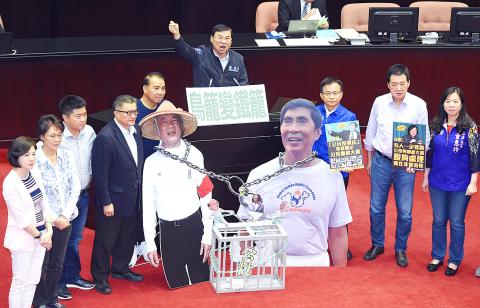Lawmakers yesterday passed an amendment to the Referendum Act (公民投票法) to decouple referendums from national elections.
The amended act stipulates that referendums are to be held on the fourth Saturday of August once every two years, starting in 2021.
The amendment was passed after lawmakers earlier in the day approved a proposal by Democratic Progressive Party (DPP) caucus whip Ker Chien-ming (柯建銘) and 66 others to hold a provisional session from yesterday through July 5 to review proposed amendments and laws.

Photo: Liao Chen-huei, Taipei Times
A procedural committee meeting was held at noon, followed by the first plenary session in the afternoon.
Plenary sessions are to be held today and tomorrow, with a second round of sessions to be held on Thursday, Friday and Thursday next week.
A third round is to be held on Friday next week and from July 1 to 5.
DPP lawmakers, who hold the legislative majority, ensured that voting at the committee meeting gave priority to dealing with proposed changes to the Referendum Act, the National Security Act (國家安全法), the Act for Industrial Innovation (產業創新條例), the Agricultural Products Market Transaction Act (農產品市場交易法) and the Food Administration Act (糧食管理法).
Chinese Nationalist Party (KMT) caucus secretary-general John Wu (吳志揚) had previously condemned the referendum bill’s advancement to the legislative floor after the DPP caucus on May 17 sent the proposal by DPP Legislator Chiang Chieh-an (蔣絜安) to a second reading without undergoing a committee review.
KMT lawmakers were holding a news conference on same-sex marriage bills at the time.
Chiang’s version included a clause that would have required people to present photocopies of their national ID cards when signing referendum petitions.
The requirement has faced opposition from several sectors of society, including the KMT, which has said it would be contravene democratic principles.
The DPP caucus had argued that the requirement would prevent bogus signatures and the names of dead people being used.
However, it agreed to remove the clause and said it would ask the Central Election Commission to deal with the issue of fake signatures, Ker said.
The commission should set up systems to identify and remove fake signatures, and to collect electronic signatures, he added.
Decoupling the referendums from national elections would help prevent a recurrence of long lines, slow voting and delayed results that occurred during the Nov. 24 elections last year, when 10 referendums were held alongside local elections, Ker said.

CHAOS: Iranians took to the streets playing celebratory music after reports of Khamenei’s death on Saturday, while mourners also gathered in Tehran yesterday Iranian Supreme Leader Ayatollah Ali Khamenei was killed in a major attack on Iran launched by Israel and the US, throwing the future of the Islamic republic into doubt and raising the risk of regional instability. Iranian state television and the state-run IRNA news agency announced the 86-year-old’s death early yesterday. US President Donald Trump said it gave Iranians their “greatest chance” to “take back” their country. The announcements came after a joint US and Israeli aerial bombardment that targeted Iranian military and governmental sites. Trump said the “heavy and pinpoint bombing” would continue through the week or as long

TRUST: The KMT said it respected the US’ timing and considerations, and hoped it would continue to honor its commitments to helping Taiwan bolster its defenses and deterrence US President Donald Trump is delaying a multibillion-dollar arms sale to Taiwan to ensure his visit to Beijing is successful, a New York Times report said. The weapons sales package has stalled in the US Department of State, the report said, citing US officials it did not identify. The White House has told agencies not to push forward ahead of Trump’s meeting with Chinese President Xi Jinping (習近平), it said. The two last month held a phone call to discuss trade and geopolitical flashpoints ahead of the summit. Xi raised the Taiwan issue and urged the US to handle arms sales to

BIG SPENDERS: Foreign investors bought the most Taiwan equities since 2005, signaling confidence that an AI boom would continue to benefit chipmakers Taiwan Semiconductor Manufacturing Co’s (TSMC, 台積電) market capitalization swelled to US$2 trillion for the first time following a 4.25 percent rally in its American depositary receipts (ADR) overnight, putting the world’s biggest contract chipmaker sixth on the list of the world’s biggest companies by market capitalization, just behind Amazon.com Inc. The site CompaniesMarketcap.com ranked TSMC ahead of Saudi Aramco and Meta Platforms Inc. The Taiwanese company’s ADRs on Tuesday surged to US$385.75 on the New York Stock Exchange, as strong demand for artificial intelligence (AI) applications led to chip supply constraints and boost revenue growth to record-breaking levels. Each TSMC ADR represents

State-run CPC Corp, Taiwan (CPC, 台灣中油) yesterday said that it had confirmed on Saturday night with its liquefied natural gas (LNG) and crude oil suppliers that shipments are proceeding as scheduled and that domestic supplies remain unaffected. The CPC yesterday announced the gasoline and diesel prices will rise by NT$0.2 and NT$0.4 per liter, respectively, starting Monday, citing Middle East tensions and blizzards in the eastern United States. CPC also iterated it has been reducing the proportion of crude oil imports from the Middle East and diversifying its supply sources in the past few years in response to geopolitical risks, expanding